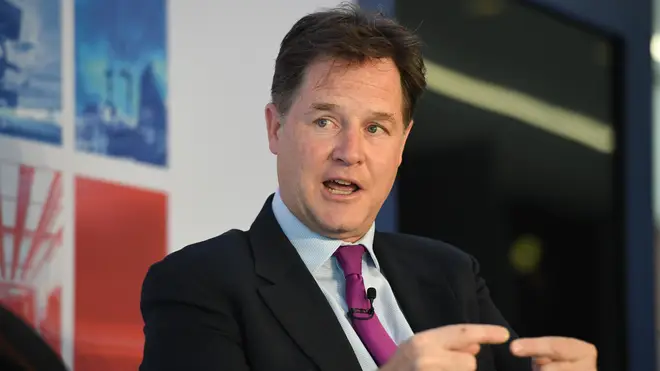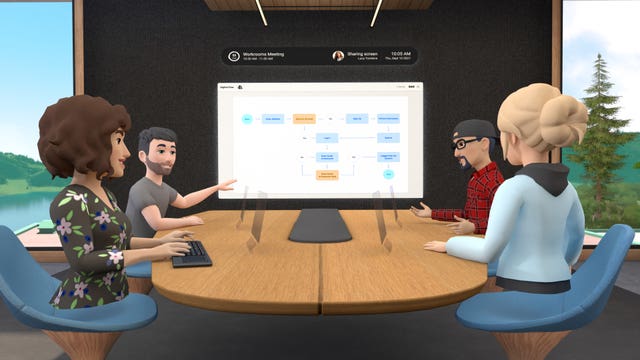
Clive Bull 1am - 4am
18 May 2022, 13:54

The former deputy prime minister, now an executive at Facebook’s parent firm Meta, has written an essay on the metaverse.
The metaverse is the “logical evolution of the internet” and will become mainstream “one way or another”, Sir Nick Clegg has said, but admitted tech firms have “a lot of work to do” to build credibility in the idea.
The former deputy prime minister, now a senior executive at Facebook’s parent firm Meta, said the technology had its risks and challenges, but if done well could be a “positive force” for inclusivity and bridge divides between people.
The metaverse is the idea of the internet becoming a 3D, virtual space into which users can be immersed using a virtual reality headset, smartglasses or their phone, and can be used for work and social experiences often using virtual avatars.

The idea has come to prominence in recent months following Facebook’s company rebrand to Meta last year, and founder Mark Zuckerberg’s declaration that the metaverse is the future of online connectivity.
Writing in an online essay, Sir Nick, Meta’s president of global affairs, said although the technology was unlikely to come to full fruition for 10 to 15 years, the metaverse would eventually have global ramifications.
“When Facebook started 18 years ago, we mostly typed text on websites,” he said.
“When we got phones with cameras, the internet became more visual and mobile. As connections got faster, video became a richer way to share things. We’ve gone from desktop to web to mobile; from text to photos to video.
“In this progression, the metaverse is a logical evolution. It’s the next generation of the internet — a more immersive, 3D experience.”

Its defining quality will be “a feeling of presence, like you are right there with another person or in another place”, he said, adding that it would “build on the interconnectedness the internet enables so that we can do more and have even richer experiences”.
“All this has the potential to unlock new opportunities and spark new ideas we haven’t yet imagined, and to have a huge positive impact both socially and economically,” he said.
“Done well, the metaverse could be a positive force for inclusion and equity, bridging some of the divides that exist in today’s physical and digital spaces.”
Offering examples of the potential benefits of the metaverse, Sir Nick described school children being able to use the metaverse to go on field trips to historic landmarks and locations and “experience them as they would have been at the time”, or medical students being able to practice surgeries virtually without the risk of harming real patients.
He also spoke of people in virtual meetings being able to respond to and feed off the body language of other participants, because of the virtual avatars being used in the online meeting space.
Many rightly ask: what is the metaverse, why does it matter, and how can Meta and other tech companies be trusted to build these technologies responsibly?
Here's my attempt to address some of these questions: https://t.co/Vh2xTFHE0I
— Nick Clegg (@nickclegg) May 18, 2022
But the former Liberal Democrat leader also acknowledged the potential dangers of the technology and the need to learn from the current internet and harmful content which appears online, which he admitted could be heightened in this new virtual world.
“Of course, the unique characteristics of the metaverse will contribute to negative as well as positive experiences,” he said.
“For example, a sense of immersion can heighten the emotional impact of offensive or aggressive interactions that would probably be less affecting in a 2D, text-based environment.”
Critics have suggested that given many platforms – including Meta-owned Facebook and Instagram, struggle to contain the levels of harmful content users are exposed to, this proposed expansion of the internet is alarming.
But Sir Nick argued that “time is on our side” with the metaverse because it was still many years from becoming a reality and therefore it was important to start a debate on the subject and how to best regulate now.
“We must create thoughtful rules and put guardrails into place as the metaverse develops to maximise its potential for good and minimise the potential harms,” he said.
He added that part of the reason for writing his essay was to increase the discussion around the subject and gain more support for it.
“Companies like Meta have a lot of work to do both to build the credibility of the metaverse as an idea, and to demonstrate to people that we are committed to building it in a responsible way,” he said.
“It means drawing on existing work to protect marginalised communities online, and listening to human and civil rights, privacy, and disabilities experts as systems and processes are developed to keep people safe.
“And it means being clear that our intention is not to develop these technologies on our own, but to be one part of a wider technological movement.”